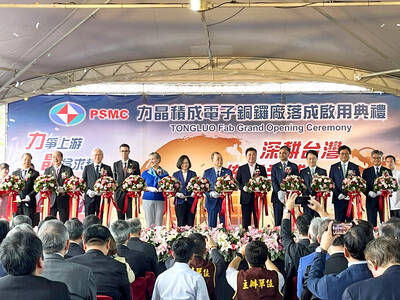CHINA
US firms cut investments
US businesses in China are slashing investments and lowering revenue projections as COVID-19 lockdowns affected operations and supply chains, a survey showed. More than half of the 121 companies polled by the American Chamber of Commerce in China have either reduced or delayed investment in the country, while nearly 60 percent of them lowered their income forecasts for this year following the latest virus outbreaks, a chamber statement said. More than 15 percent of the US companies with operations in Shanghai — which has been placed under lockdown for more than a month — reported their business there remains fully shut, the survey, conducted from April 29 to Thursday, showed. Nearly 60 percent of the respondents, who have operations throughout the country, said that production capabilities were slowed or reduced due to a lack of employees, difficulty in obtaining supplies or government-ordered lockdowns.
AIRLINES
Qantas expands points sales
Qantas Airways Ltd is making every seat on more than 1,700 flights purchasable with air miles, allowing customers to burn through a mountain of loyalty points built up during the COVID-19 pandemic. Passengers are to be able to use points on all flights in August on more than 30 routes in Australia, Qantas said yesterday. The almost 130,000 seats would be available on mostly regional routes from cities including Melbourne and Sydney. Airlines normally set aside only a certain number of seats for points redemptions, and offering every seat on so many flights is unusual. So-called points planes have emerged since COVID-19 as a way to tap pent-up travel demand among frequent flyers who accumulated air miles while stuck on the ground.
CARBON TRADING
Firm to trade offsets
A Singapore carbon exchange is teaming up with Germany’s main bourse to launch futures trading for carbon offsets as early as this year to meet the growing demand from companies to hedge their risks from greenhouse gas emissions. The futures contracts would be created by Deutsche Boerse AG using carbon credits sourced by Singapore-based AirCarbon Pte. The plan would be to trade the contracts on the European Energy Exchange, AirCarbon cofounder and chief executive officer Thomas McMahon said. BloombergNEF, a clean energy research group, estimates that the market for offsets could either skyrocket past US$100 billion or crumble if there are little improvements in quality.
MALAYSIA
IPO stream to stay strong
The pipeline for initial public offerings (IPOs) is likely to remain robust for the rest of the year, as excess cash buoys demand, the chief of the stock exchange operator said yesterday. “Our lead stream is strong, we have pent-up availability, the market support for IPOs this year has been very good,” Bursa Malaysia Bhd chief executive officer Muhamad Umar Swift said in a Bloomberg TV interview. “There is still a lot of liquidity in the Malaysian market chasing new offerings.” Malaysia topped its Southeast Asian peers in IPO proceeds raised in the first three months of this year, with five firms netting US$362 million through first-time share shares, Ernst & Young LLP said. Dairy producer Farm Fresh Bhd and its shareholders raised about 1 billion ringgit (US$228.1 million) in March in the nation’s largest IPO since July.

BUSINESS UPDATE: The iPhone assembler said operations outlook is expected to show quarter-on-quarter and year-on-year growth for the second quarter Hon Hai Precision Industry Co (鴻海精密) yesterday reported strong growth in sales last month, potentially raising expectations for iPhone sales while artificial intelligence (AI)-related business booms. The company, which assembles the majority of Apple Inc’s smartphones, reported a 19.03 percent rise in monthly sales to NT$510.9 billion (US$15.78 billion), from NT$429.22 billion in the same period last year. On a monthly basis, sales rose 14.16 percent, it said. The company in a statement said that last month’s revenue was a record-breaking April performance. Hon Hai, known also as Foxconn Technology Group (富士康科技集團), assembles most iPhones, but the company is diversifying its business to

ARTIFICIAL INTELLIGENCE: The chipmaker last month raised its capital spending by 28 percent for this year to NT$32 billion from a previous estimate of NT$25 billion Contract chipmaker Powerchip Semiconductor Manufacturing Corp (力積電子) yesterday launched a new 12-inch fab, tapping into advanced chip-on-wafer-on-substrate (CoWoS) packaging technology to support rising demand for artificial intelligence (AI) devices. Powerchip is to offer interposers, one of three parts in CoWoS packaging technology, with shipments scheduled for the second half of this year, Powerchip chairman Frank Huang (黃崇仁) told reporters on the sidelines of a fab inauguration ceremony in the Tongluo Science Park (銅鑼科學園區) in Miaoli County yesterday. “We are working with customers to supply CoWoS-related business, utilizing part of this new fab’s capacity,” Huang said, adding that Powerchip intended to bridge

Apple Inc has been developing a homegrown chip to run artificial intelligence (AI) tools in data centers, although it is unclear if the semiconductor would ever be deployed, the Wall Street Journal reported on Monday. The effort would build on Apple’s previous efforts to make in-house chips, which run in its iPhones, Macs and other devices, according to the Journal, which cited unidentified people familiar with the matter. The server project is code-named ACDC (Apple Chips in Data Center) within the company, aiming to utilize Apple’s expertise in chip design for the company’s server infrastructure, the newspaper said. While this initiative has been

Qualcomm Inc, the world’s biggest seller of smartphone processors, gave an upbeat forecast for sales and profit in the current period, suggesting demand for handsets is increasing after a two-year slump. Revenue in the three months ended in June will be US$8.8 billion to US$9.6 billion, the company said in a statement Wednesday. Excluding certain items, earnings will be US$2.15 to US$2.35 a share. Analysts had projected sales of US$9.08 billion and earnings of US$2.16 a share. The outlook signals that the smartphone market has begun to bounce back, tracking with Qualcomm’s forecast that demand would gradually recover this year. The San